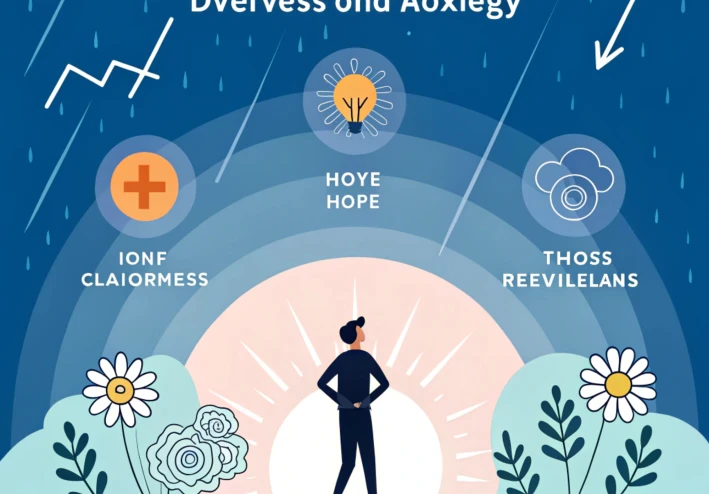
How Positive Psychology Helps You Overcome Stress and Anxiety in Times of Crisis
1. Introduction: A World Full of Crises and Stress
Talking about crises is no longer a distant subject in newspapers—it has become part of our daily reality. Economic downturns disrupt family stability, political unrest heightens collective anxiety, and personal or relational struggles add layers of emotional pressure. In the midst of this storm, people desperately seek tools to regain balance and peace of mind. Positive psychology emerges as a powerful approach, not just to reduce anxiety, but to transform the way we experience challenges by focusing on strengths instead of weaknesses.
2. What Is Positive Psychology and Why Is It Different?
Positive psychology, pioneered by Martin Seligman in the late 1990s, is a relatively new branch of psychology that emphasizes enhancing the positive aspects of life rather than only treating disorders and deficits.
While traditional psychology aims to reduce pain and dysfunction, positive psychology seeks to build happiness, cultivate strengths, and foster human flourishing. This shift makes it a practical tool in times of crisis: it doesn’t merely eliminate suffering but equips you with inner resources to face challenges with resilience and optimism.
3. The Link Between Crises and Anxiety: Why Do We Suffer So Intensely?
Anxiety is a natural response to uncertainty and lack of control.
During crises, resources like money, safety, or social support shrink, amplifying feelings of helplessness.
The brain tends to magnify perceived threats, which escalates stress and anxiety levels.
But with the right mindset, anxiety can be reframed from a barrier into a motivator for growth and change.

4. How Positive Psychology Rewires Your Thinking
The mind is like a muscle—it can be trained.
By practicing gratitude or reframing negative thoughts, neural pathways begin to reorganize.
This process, called neuroplasticity, enables us to break free from habitual worry patterns.
Positive psychology teaches us to see the glass half full, even during turbulent times, fostering hope and inner strength.
5. Positive Psychology Techniques to Overcome Stress and Anxiety
A. Practicing Gratitude
Gratitude is more than saying “thank you”—it’s a mindset. Writing down three things you are grateful for each day rewires your brain to focus on abundance instead of fear.
B. The Power of Optimism
Realistic optimism allows us to anticipate better outcomes and fuels the energy to face difficulties. Research shows that optimistic individuals recover faster from setbacks.
C. Reframing Events
Instead of viewing crises as disasters, reframing allows us to see them as opportunities for growth, learning, or redefining priorities. This skill significantly reduces the intensity of stress.
D. Mindfulness and Meditation
Mindfulness calms the mind and reduces overactive negative thinking. Just ten minutes of meditation daily can lower anxiety levels and improve mental clarity.
E. Positive Relationships and Social Support
Healthy relationships create a sense of safety. Sharing your feelings with supportive people lightens emotional burdens and strengthens resilience.
F. Setting Small Goals and Daily Achievements
Completing small goals, such as a workout session or finishing a simple task, restores a sense of control and reduces stress.
6. Positive Change: Turning Crises Into Opportunities
A crisis is not always the end—it can be a new beginning.
Losing a job may push you to learn a new skill or change careers.
A health scare might inspire a healthier lifestyle.
Family conflicts can become a doorway to better communication.
Positive psychology encourages us to see crises not as permanent obstacles, but as catalysts for transformation and personal growth.
7. Real-Life Examples
Someone who lost their job used the free time to master digital skills, eventually building a new career.
A person going through divorce found healing through mindfulness and journaling, which led to a stronger sense of self.
Another individual burdened by debt practiced gratitude and optimism, fueling the energy needed to work smarter and eventually become debt-free.
8. Quick Actionable Tips You Can Start Today
Write down three things you’re grateful for every day.
Practice deep breathing exercises for 5 minutes morning and evening.
Limit exposure to excessive negative news.
Surround yourself with positive and supportive people.
Break large goals into small, manageable steps.
Make time for hobbies, rest, and creative outlets.
9. Conclusion: Building a Balanced and Resilient Life
Stress and crises are inevitable parts of life. But how we respond to them determines their impact. Positive psychology is not merely an academic theory; it’s a lifestyle that equips you with practical tools to reduce anxiety, reframe challenges, and build long-lasting resilience. Through gratitude, optimism, mindfulness, and supportive relationships, you can transform every crisis into an opportunity for self-discovery and growth.






































